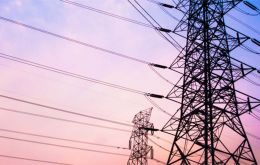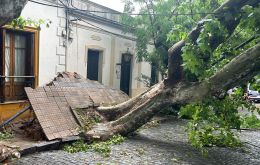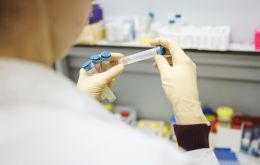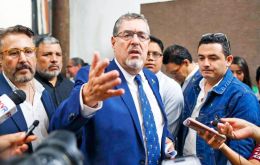MercoPress. South Atlantic News Agency
Stories for December 18th 2023
-
Monday, December 18th 2023 - 10:59 UTC
New attempt to reform Chile's Constitution fails

Chile voted 55.45 % against the new Constitution and thus the one passed in the early 1980s under former dictator Augusto Pinochet Ugarte will remain in force, it was reported Sunday in Santiago.
-
Monday, December 18th 2023 - 10:58 UTC
Unprecedented storm: Roof collapses in Bahía Blanca killing 13

At least 13 people were reported dead in the city port of Bahía Blanca some 690 kilometers south of the Argentine capital and three others elsewhere in the province of Buenos Aires after Sunday's storms. Parts of the Buenos Aires Metropolitan Area (AMBA), where one victim was reported, and other provinces were left without electricity for hours.
-
Monday, December 18th 2023 - 10:53 UTC
Argentina to buy electricity from Brazil due to storm

Following the disruption caused by last weekend's storms to the country's grid, Argentina will import electricity from Brazil on a transitory basis, it was reported Sunday, in addition to other emergency measures adopted to face the crisis and restore supply in parts of the Autonomous City of Buenos Aires (CAMA) and its Metropolitan Area (AMBA).
-
Monday, December 18th 2023 - 10:41 UTC
Brazilian diplomacy manages to cool tensions between Venezuela and Guyana

In what is considered a success for Brazilian diplomacy, Venezuela and Guyana pledged in a joint statement last Thursday, not to resort to force to settle a long-standing dispute over contested land and adjoining sea in an oil and gas-rich region known as the Essequibo.
-
Monday, December 18th 2023 - 10:33 UTC
Milei booed at Boca Juniors elections for supporting Macri

Argentine President Javier Milei was jeered and called names Sunday when he cast his vote for Andrés Ibarra for president of Club Atlético Boca Juniors at the iconic Bombonera stadium in Buenos Aires before leaving for the storm-hit Bahía Blanca.
-
Monday, December 18th 2023 - 10:17 UTC
Fallen trees result in two deaths in Uruguay amid storm

Uruguayan authorities confirmed Sunday that at least two people were killed in the city of Colonia del Sacramento as a result of the heavy storm hitting the area. Heavy rains and material damages were also reported in Montevideo, Durazno, Canelones, and other southern areas.
-
Monday, December 18th 2023 - 09:58 UTC
Covid-19: First Pirola case confirmed in Ecuador

Ecuadorian authorities confirmed Sunday the detection of the first case of the so-called Pirola variant (BA.2.86) of the SARS-CoV-2 virus in a woman in Quito, who has been reported to be stable and “receiving outpatient treatment at home,” according to a statement from the Health Ministry, which is carrying out an epidemiological follow-up and monitoring of the patient.
-
Monday, December 18th 2023 - 09:56 UTC
Clearing the way for Guatemala elected president to take office in January

Guatemala the Central American country long linked to political instability and extreme violence in solving many of its domestic conflicts, is again a hotspot in the region since an elected president, who should be taking office in mid-January, has been facing growing supposedly 'legal' impediments to his legitimate right, supported by an overwhelming majority of voters who surprised the “political establishment”.
